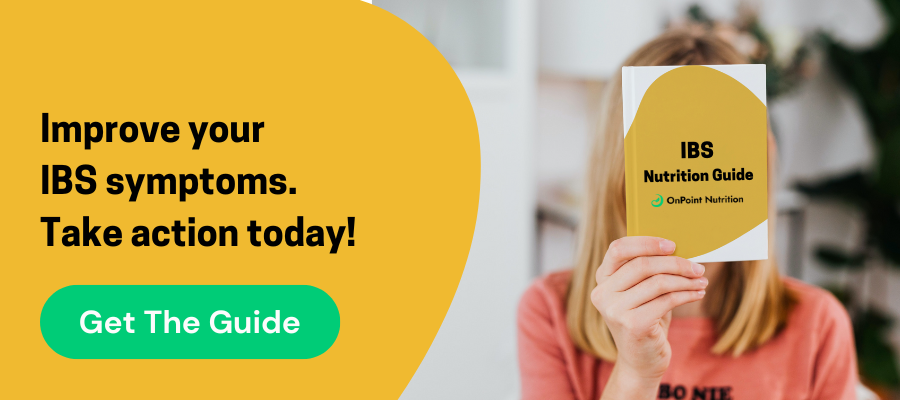
What is IBS-C?
IBS-C is defined as “constipation-predominant” IBS. Although constipation is the main symptom, it is often accompanied by stomach and abdominal pains, as well as bloating and straining to go to the bathroom. In order to identify if you suffer from IBS-C, it’s important to ensure your definition of constipation is correct. The medical definition is "difficulty emptying the bowels, usually associated with hardened feces”. If you suspect you have IBS-C, you’re not alone. IBS-C impacts up to 13 million Americans.
Passing stool three times per week or less is a good baseline for whether you should talk to your doctor about IBS-C treatment. Doctors and scientists think that constipation is caused by two main factors:
- Food moves through your digestive system too slowly
- Your body absorbs too much liquid as it digests your food
Treatment includes both medical and dietary improvements. Like broad IBS recommendations, non-medical treatments include slowly increasing fiber intake, drinking more water, and increasing physical activity such as walking. Medical options include over-the counter drugs and prescription medicines.
IBS-C Symptoms
- GERD
- GERD, or Gastroesophageal Reflux Disease, is often an accompanying symptom of IBS-C . In fact, 63% of people with IBS also have GERD. People with IBS have more sensitive digestive systems, called visceral hypersensitivity, which is why symptoms can often be uncomfortable and painful. Visceral hypersensitivity affects the entire digestive system, so people with IBS will feel the effects of reflux or heartburn more than the average person. Another factor that may produce higher rates of GERD in people with IBS is slowed gastrointestinal motility, causing food to sit in the stomach longer and produce reflux.
- Bloating
- Bloating is a common IBS-C symptom and is often experienced on a daily basis. Bloating manifests as abdominal distention and tightness of clothing. Although constipation is not the cause for bloating, it can exacerbate the symptom.
- Abdominal Pain
- Abdominal pain with IBS-C can occur for many reasons. First, people with IBS have heightened sensitivity in their gut, called visceral hypersensitivity. Because of this sensitivity, natural pressure in the intestines (from gas and waste) can be especially painful. The second cause of abdominal pain is related to disruption of bowel movements. With IBS-C, constipation can cause increased waste to build up in the intestines, which can cause pressure and pain when moving your bowels.
Effects of IBS-C
Severe IBS-C can negatively impact quality of life. Although most people can find ways to manage symptoms, some people may find that their IBS-C impedes on life events. Travel, for example, is one of the most common triggers for IBS-C (and a time that people wish they could avoid symptoms the most!) Read some tips on how to manage IBS-C while traveling.
- Reduce stress
- Going on a trip with IBS can be stressful, and as we know, stress exacerbates pre-existing IBS symptoms. Stress reduction techniques are a must before traveling to ensure your IBS stays at home. Our favorite stress reduction techniques are talking to your travel buddies, listening to a calming playlist, or meditating before or during your travel.
- Keep your routine
- The human body loves routine, which is why it’s important to maintain your normal schedule as much as possible while traveling. Try keeping sleep schedule, meal and snack times, and bathroom breaks consistent. Your body won’t even know you’ve left your home base!
- Be prepared in case of emergency
- Although we recommend natural methods of controlling IBS symptoms first, we do know that IBS flares while traveling are sometimes unavoidable. For IBS-C, be sure to pack laxatives or other fiber supplements that help you use the bathroom when things get really backed up.
- Stock up on "safe" foods
- Everyone’s safe foods are different, but if you’ve done the work to figure out what foods help relieve your IBS-C, be sure to stock up on them for your trip. High fiber foods can help avoid constipation during travel.
- Stay hydrated
- One of the easiest ways to keep constipation at bay is through hydration. Be sure to keep up with water while traveling, even if it means more bathroom breaks.
How can I treat my IBS-C?
Many fellow Americans are frustrated with existing remedies for IBS-C, as there is currently no one-size-fits-all approach. We recommend starting with natural remedies, such as diet and behavior modification first, and using medication only in extreme cases or as needed in emergencies. Read more about potential treatment options below.
Avoid known food triggers
The most reliable method for keeping IBS symptoms under control is knowing your food triggers. Because each person’s food triggers are different, it may take some time to discover what yours are. Common trigger foods for all IBS types include caffeine, alcohol, spicy food, high fat food, and large quantities of raw vegetables. IBS-C is often better treated by incorporating more of the right foods. High fiber foods such as fruits, vegetables and whole grains tend to help relieve IBS-C symptoms.
Fiber modification and fiber supplements
Many people find that increasing fiber intake, especially insoluble fiber, helps induce bowel movements. Insoluble fiber is found in whole grains, vegetables, fruits with seeds, beans, lentils, nuts and seeds. Some people may need to take a fiber supplement to get things moving. The best fiber supplement for IBS-C is Psyllium Husk (Metamucil), although we recommend trying dietary changes first before utilizing supplements.
Digestive Enzymes
Digestive enzymes assist with breaking down food in the digestive system, which can help relieve IBS-C. The research on their effectiveness is still fairly limited, but many people have noticed positive effects of enzymes used for IBS with constipation.
Laxatives
Laxatives can be an effective treatment for IBS-C, but should be used with caution. When laxatives are used unnecessarily, they can cause diarrhea, abdominal cramping, and pain. Laxatives can also be habit forming when used consistently and lose their effectiveness over time.
- Stimulant laxatives include bisacodyl (Correctol, Dulcolax), sennosides (Ex-Lax, Senokot), castor oil, and the plant cascara. With these laxatives, the active ingredient triggers muscles in the bowels to contract, moving stool through. Talk with your doctor before you take these medications. Over time, senna can damage nerves in the colon wall, and the drugs may stop working.
Osmotic laxatives include lactulose, which is prescribed by a doctor, and polyethylene glycol (Miralax), which you can buy over the counter. They pull water back into the colon to soften stool. This process makes it easier to pass, but research has found that they only help with constipation. They may actually make other symptoms worse. Side effects include diarrhea, dehydration, and bloating. Osmotics are considered fairly safe for long-term use for some people with IBS-C, but talk it over with your doctor before you use them regularly.
Prescription medication
- There are a number of prescription drugs currently on the market. Work with your nutritionist and doctor to design a treatment regimen:
- Linaclotide (Linzess) treats both men and woman with IBS-C when other treatments have not worked. The drug is a capsule you take once daily on an empty stomach, at least 30 minutes before the first meal of the day. It helps relieve constipation by helping bowel movements happen more often. People age 17 or younger shouldn’t take it. The most common side effect is diarrhea.
- Lubiprostone (Amitiza) treats IBS-C in women who haven’t been helped by other treatments. Studies haven't fully shown that it works well in men. Common side effects include nausea, diarrhea, and belly pain.
- Plecanatide (Trulance) is a prescription medication that has been shown to treat constipation without the usual side effects of cramping and abdominal pain. The once-a-day pill can be taken with or without food. It works to increase gastrointestinal fluid in your gut and encourage regular bowel movements. Doctors may suggest other medications to help relieve some symptoms of IBS, such as constipation, diarrhea, or belly cramping.
- Antispasmodics: Antispasmodic drugs such as dicyclomine (Bentyl) and hyoscyamine(Levsin) relieve the stomach cramps brought on by IBS by relaxing the smooth muscle of the gut. But they also may cause constipation, so they aren't usually prescribed for people who suffer IBS-C. Other side effects are dry mouth, drowsiness, and blurred vision.
Is my IBS-C actually Chronic Idiopathic Constipation (CIC)?
It may be difficult to tell whether you have IBS-C or another functional bowel disorder- this is where the doctors come in. Researchers are beginning to understand CIC and IBS-C as similar functional disorders along a sliding scale of severity. Adam Leitenberger put it this way: "Our results argue that for many patients, CIC and IBS-C are not separate and distinct entities but more likely reside on a ‘spectrum’ of disease with abdominal symptoms."
However, in terms of definitions, think of it this way. Just because you experience constipation does not mean that you have IBS-C. Here are a few ways to tell the difference:
Your constipation is IBS-C if:
- Your constipation is associated with stomach pain
- Your constipation may alternate with other IBS symptoms such as diarrhea or bloating
- You can find a medical discussion of CIC here
To read more about foods to avoid, foods to eat, and how to make easy changes to your IBS diet to mitigate your symptoms, download our IBS Nutrition Guide.
Topics

Kaitlyn Willwerth is a Registered Dietitian at OnPoint Nutrition. Kaitlyn's work focuses on providing individualized health and lifestyle coaching and, most importantly, support. She is a Certified LEAP Therapist and has also completed the Monash University 'Low FODMAP Diet for IBS' online training course for health professionals.




